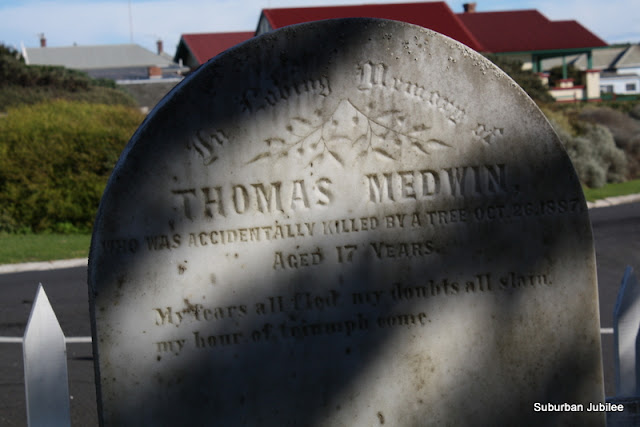Beautiful monumental headstone in Strahan
While on our holiday we popped into a couple of cemeteries, at Strahan and Stanley. Not the usual place for tourists but I think they reveal so much about the area and the past and a lot can be gleaned from them.
For one thing the type of headstone typical to a certain era. They have become much more modest and simplistic now days. Many of these stones are "signed" by their maker and also from whence they came. I had assumed them to be locally carved but many came from Melbourne in the early 1900's which meant an order was sent off and then they were shipped by boat. It must have been quite an expense.
Now THIS is really something. This is a headstone erected in 1892 for a little one who died at the age of 11, not uncommon for this time but the headstone itself is made from a slab of Huon pine! No other timber could have withstood the weathering and is a true testament to the amazing qualities of Huon. Huon pine is indigenous to this area so would have been readily available but you would not commonly see this used in any other cemetery.
Here is a more modern one using Huon pine dated in the 1960's.
Another thing we noted about this cemetery in Strahan was that from the late 1800's - early 1900's there seemed to be more graves for males than females and many were in the 20's. Back in those times this area was still very isolated and quite wild, I would imagine females were definitely outnumbered. So many young deaths also suggests that medical attention may not have been readily available at that time, certainly no near hospital and supplies would take months to reach this area.
Stanley was quite different. There was a lot more monumental carvings also from Melbourne. I'm not sure if this implied more wealth in the area or whether goods were more readily accessed by boat. Certainly there were a lot more females in this cemetery. More females also meant more children's graves.
Clearly there was a lot more family settlement in Stanley in the same period of 1880-1920 than there was in Strahan. This marker above is inscribed for the Medwin children
Thomas died 1876 aged 1 hour.
Andrew died 1885 aged 4 months and 10 days
Phillip died 1888 aged 6 months and 11 days.
One can only imagine how these parents must have hoped and held their breaths praying their children would make it through those first couple of fragile years.
Here is another Medwin killed by a tree in 1887 at just 17yrs of age.
Again, during this time there were a significant amount of graves of people aged before 30 but many of them were women, quite a few with their infant children. When we think about the world's burgeoning population, we think of the advances in medicine and the much older age people live to now but we sometimes forget how rarely people die in childbirth now.
The Medwin's were clearly a large extended family in the area.
This was one of my favourite inscriptions,
"She was ___________________________
But words I cannot find to tell you what,
Think what a good wife ought to be,
And she was that."
Was this literally what Matthias Medwin wanted on his wife's headstone or was it his grief stricken instructions, being lost for words to describe the depth of his admiration, that were misinterpreted? When he wrote to the stone mason was he asking for this to be carved or was he in fact asking the mason to come up with a brief fitting devotional?
What do you think.
Either way, I find it speaks volumes about loss, grief, admiration and respect.
Another beautiful inscription,
"Then why should the tears run down
And your hearts be sorely riven
For another gem in the Saviour's crown
And another soul in Heaven"


















































